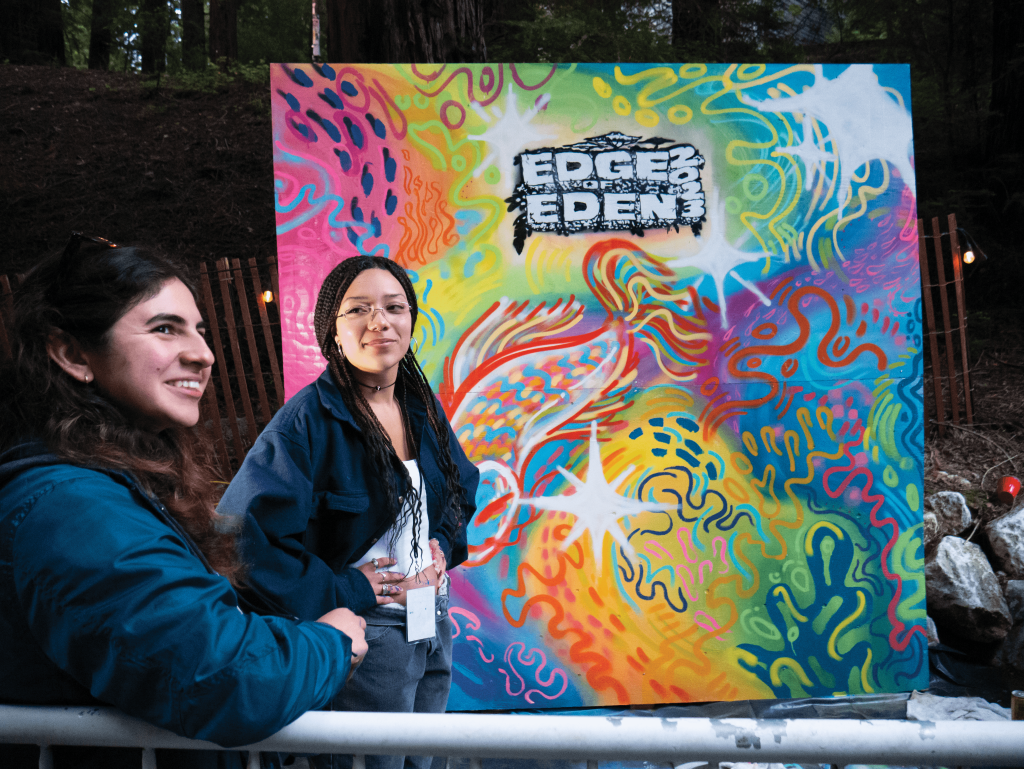Fluorescent blue lights reflected off every inch of the treeline, smoke spilled over the stage at the heart of the Quarry Amphitheater, and flocks of students migrated from their seats to the pit the moment a sound erupted from the speaker system.
The only thing that could cut through the dense forest was the crowd’s boisterous cheers for Mothership Connection, the show’s emcees; Dream Ivory, the opening act; and Inner Wave, the headliner for the night.
On May 26, nearly 1,300 students gathered in the Quarry Amphitheater to attend Edge of Eden, the largest concert at UC Santa Cruz all year.
But the true magic was invisible to most. The Slug Life Productions Board (SLPB) backstage office was the heart of the event — where volunteers and organizers worked tirelessly to make their dream of throwing a concert for the campus community a reality.
“We’ve been working up to this point for about a year and a half now,” said Hospitality Manager for SLPB, Adelina Rocha. “We’re just trying to prove to the school through all our volunteer work that there needs to be concerts on campus for the students — to unify us, to make us feel connected to the space and to each other.”
In addition to the live performances, the event boasted a live mural painting, a photobooth with a plethora of quirky props, and the Alebrijes Oaxacan food truck.
SLPB consists of 14 students, including leaders Jai Castro, Ari Meister, Israel Lasarow, and Mackenzi Rauls, who have spent the last year and a half jumping through administrative hoops to try to prove that an event at this scale was possible for the campus.
“This event in particular has had the most amount of work go into it,” said Danny Osorio, Production Assistant at the Quarry Amphitheater. “Ari and Jai had to start this from the literal ground up.”
Castro and Meister have had weekly meetings since the beginning of last summer, working closely with Jose Reyes-Olivias, general manager of Quarry Amphitheater, to secure the space and make sure the event runs smoothly.
“Great artists have come through here before but it’s taken the university so long to realize how much potential the space has,” Meister said.
Other UC schools, like UC Santa Barbara, UC Riverside, and UCLA maintain a budget specifically for concerts and live events, partially paid for in students’ quarterly campus fees that are then allocated to their production boards.
These student-run boards utilize their funding and administrative support to hold large-scale events like Extravaganza at UC Santa Barbara, or Sun God Festival at UC San Diego.
Unlike other schools, UCSC does not have any funding delegated specifically to putting on live concerts.
Thus, organizers for Edge of Eden had to spend months petitioning each college for funding in an attempt to raise the $65,000 that was needed to manifest their vision.
Historically, a majority of events on campus are often held within the separate college communities, rather than for the entire campus community. To many students, this makes the idea of a united student body seem somewhat elusive.
“Not communicating with each other regularly prohibits us from making real change in the university that we want to see happen,” said Rocha. “A lot of us wish for a lot of things, we hope stuff will get better but in order to have real action, we need to utilize the power of community and each other. Nobody can do this alone.”
CHP polled 97 students around campus to ask if they would attend future UCSC live events. The answer from all was a resounding yes.

Erika Gaxiola (left), Anjolie Serna De Leon (right), Vanessa Murray and Ria Chockalingam (not pictured), all students in the art department, collaborated on a live mural painting during the event.
“[It] was so fun getting to work with so many artists I admire,” said Serna De Leon. “We got to feel the music, feel the vibes and just flow together.”
Organizers hope the success of Edge of Eden proves that large concerts at UCSC are both feasible and heavily desired amongst the student body. They point to the countless hours of voluntary labor offered by everyone involved as a testament to students’ commitment towards making large scale events happen.
“I want people to come out of this feeling like they’re entitled to this sort of thing,” said Meister. “This is something that should exist at UCSC, not just once a year.”

